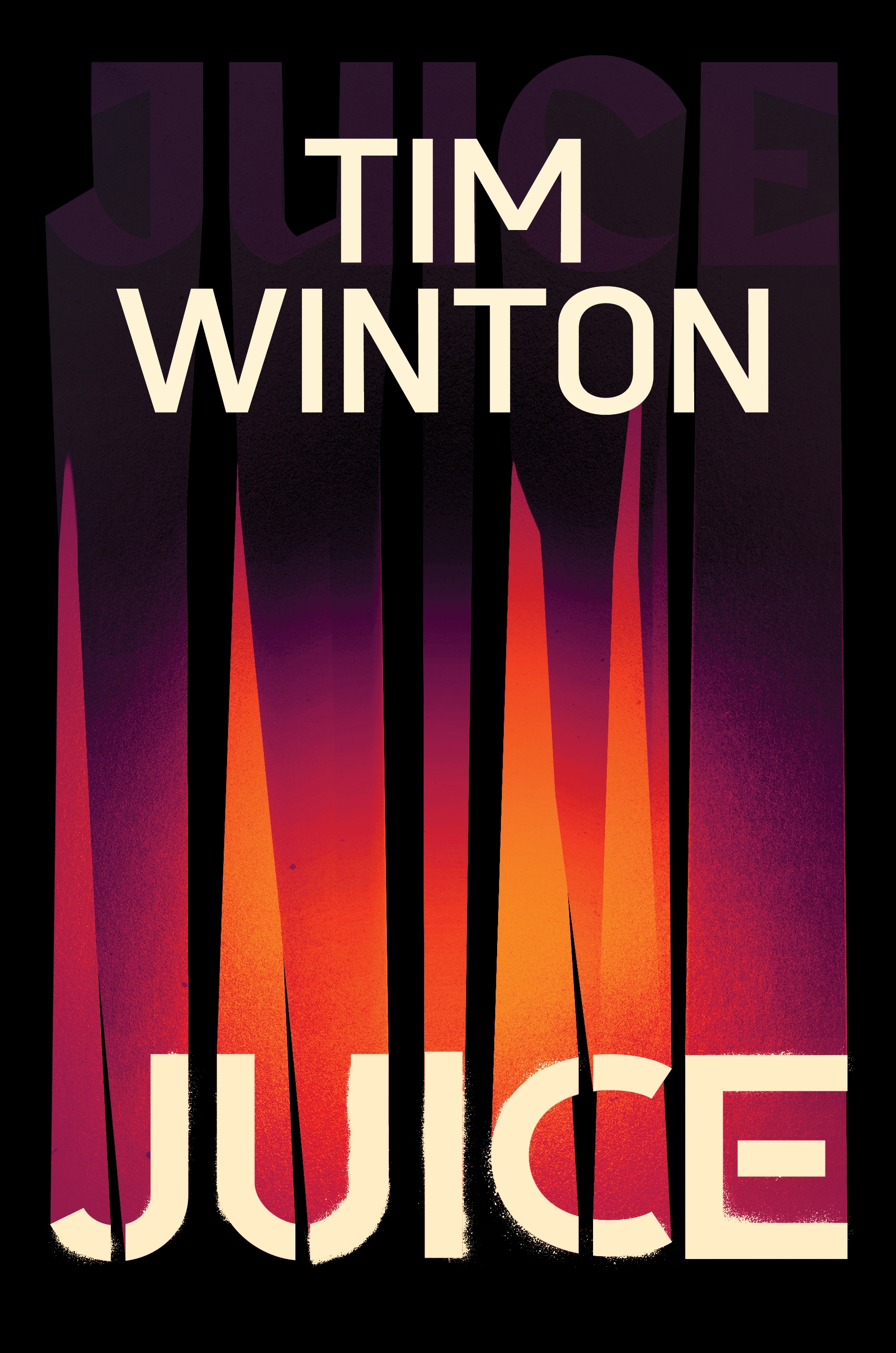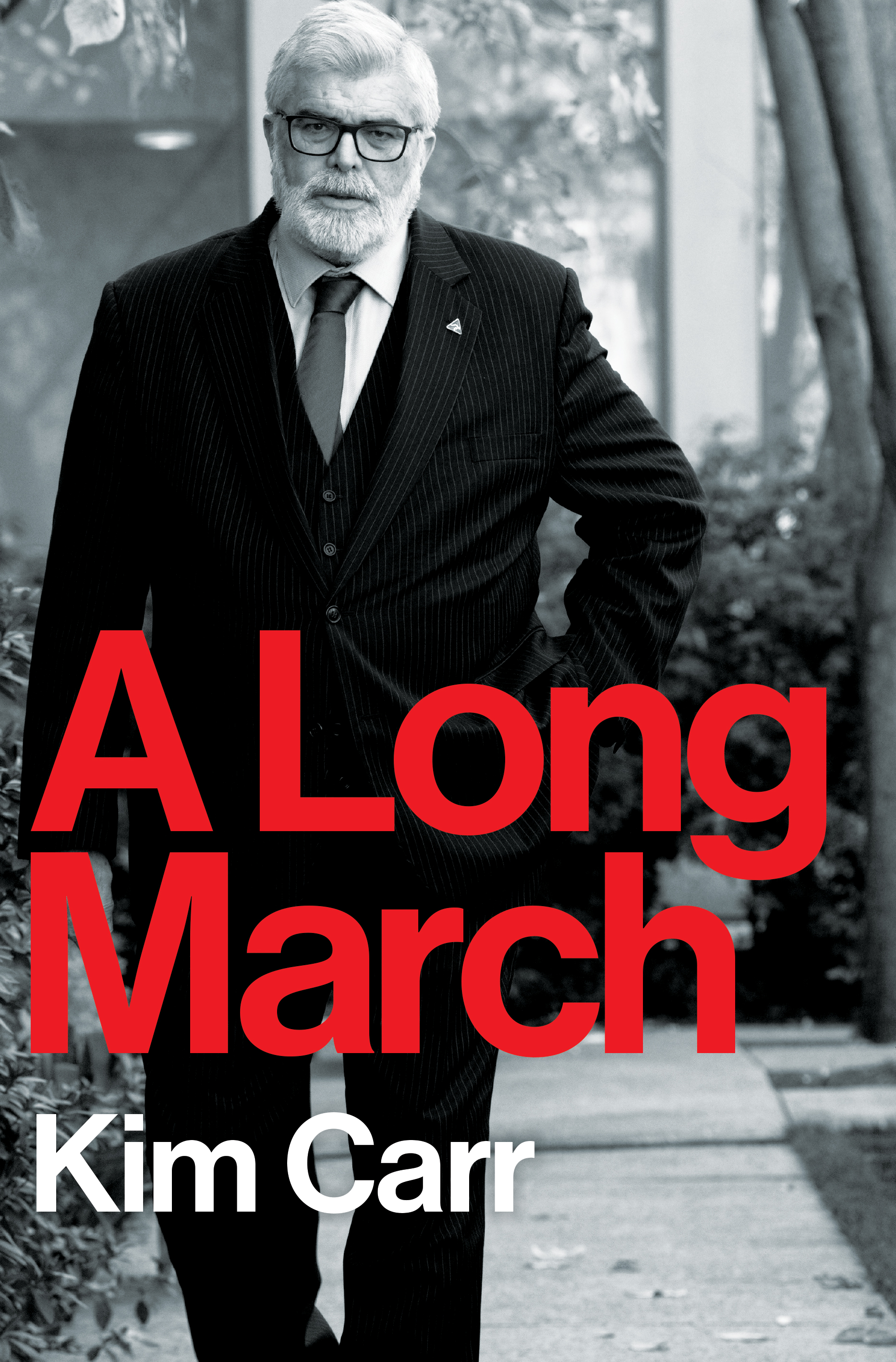ABR receives a commission on items purchased through this link. All ABR reviews are fully independent.
‘Schooled in doubleness’
Clocking in at 513 pages, Tim Winton’s new novel carries all the apparatus of a major publishing event. Juice is an ambitious work, technically very skilful, which seeks to delineate not only a dystopian prospect of the planet’s future but also an alternative, revisionist version of its historical past.
The book is set ‘at the frontier of the tropics’ in Western Australia, at a future time probably a couple of centuries hence. It starts with the unnamed narrator and a child seeking refuge in a disused mine, only to find themselves taken prisoner by a ‘bowman’, to whom our hero relates his life story. He begins by describing how he and his widowed mother eked out a frugal living as ‘homesteaders’ through local foraging and trading. In this era of climate catastrophe, when ‘the sun ate everything in sight’, it had become necessary to spend the months from October to April living underground; even in winter, it was impossible to go outside after mid-morning. ‘Winters were hot,’ recalls the narrator, but ‘summers lethal’. The remark on the second page about how the sun ‘[b]reaks free of all comparisons’ directly echoes the point Jacques Derrida made in ‘White Mythology’ about how the sun is ‘the nonmetaphorical prime mover of metaphor’. This is suggestive of the dense theoretical infrastructure that characteristically lies just below the surface of Winton’s colloquial brevity. Just as Winton’s early novel Shallows (1984) engages intertextually with Herman Melville’s Moby-Dick, so Juice self-consciously addresses the subjugation of human language to environmental, ‘nonmetaphorical’ phenomena.
One of this book’s strongest aspects is its presentation of radically different annual and diurnal cycles as though they were entirely natural. Rather than the sometimes wilder hypotheses of speculative fiction, Winton’s short chapters and sentences, along with his first-person narrative and minimalist style, conjure up a world whose routines appear to be not only realistically embedded but also inevitable. This is achieved partly through a double retrospective narrative, by which the protagonist looks back on both his own life and also earlier periods such as ‘The Dirty World before the Terror’, when unspecified bad events happened. ‘As you know,’ says the narrator to the bowman, ‘that age of turmoil was universal.’ As readers we don’t ‘know’ any such thing, of course, but by this retrospective strategy Winton makes his post-apocalyptic scenario appear entirely plausible. The daily rituals of winter are recorded without any hint of melodrama: ‘We got up at two every morning. Finished our chores by five and worked on the house until the heat sent us indoors.’ The narrator also comments on how ‘folks in the olden days ... even ate birds’. Again, this time shift displaces a controversial issue of the present day into a more distant perspective, whereby we are invited to look back on these ‘olden days’ (our own time) with puzzled bewilderment.
The main trajectory of the plot involves the protagonist’s voluntary engagement with an activist organisation known simply as ‘the Service’, which educates him in history and so disturbs his stoical inclination to acquiesce in the norms of ‘realism’ and ‘common sense’ inherited from his childhood. The ‘idea that our travails were the result of others’ actions had never occurred to me’, he observes. He laments how his compatriots had been ‘convinced by propaganda that their servitude was freedom’ and thus ‘collaborated in their own entrapment’.
The bowman holding the narrator captive turns out to be a fellow ‘comrade’, another veteran of the Service, and they begin to reminisce about their earlier crusading days. Winton’s hero recalls how, after learning about ‘the empire that poisoned the air and curdled the seas’, he embarked willingly on a series of violent missions to root out the ‘bloodlines and networks’ that lingered even after the death of their nefarious empire. Oil companies and ‘faceless corporations’ are particularly in the firing line here, and human ‘objects’ are ‘acquitted’ in a ruthless, impersonal manner, with the old soldier declaring he had no compunction in dispatching ‘a man whose class and trade and prodigious inheritance had helped asphyxiate half of life on earth’. The ‘juice’ of the title is thus presented not only as a colloquial term for the energy produced by oil companies – the companies had ‘every sort of juice. The stuff that drove engines, trade, empire’ – but also the energy that drives the hero’s motivation and resilience, his ‘moral courage’, as the author described it in a recent interview. ‘It takes a lot of juice to perform,’ his fictional counterpart observes.
This James Bond aspect gives the novel pace and momentum, and it is handled well. It also introduces plot complications in relation to the hero’s own family, which are revealed as the book unfolds. But while this story is compelling in itself, the quasi-religious inclinations informing it seem more disturbing. The belief here in the sanctity of environmental activism and the evil nature of Western oil companies suggests the Manichaean consciousness that underlies this narrative, with the Service dedicating itself ‘to purify, not to conquer’. ‘Conviction’ here becomes its own justification, with the protagonist avowing, like all religious militants, that ‘our cause was just, and our faith was strong’. By comparison with, say, Kim Stanley Robinson’s New York 2140, which shows Manhattanites buoyantly raising prices for apartments on the top floors of urban skyscrapers as the floodwaters rise, Winton’s book embraces a more ascetic, humourless tone.
This quest for radical purification is reinforced not only by a mood of stern pragmatism but also by frequent references to ancient sagas, the Bible, and Shakespeare, all of which serve to integrate Juice into a literary tradition of epic conflict running back through the bellicose Viking sagas. The twin epigraphs to Juice are taken from Homer’s Iliad and a song by the Yellowjackets, as if to indicate how the author is attempting here to combine popular realism with classical myth. These mythical allusions are not intrusive or ostentatious but integrated unassumingly, as when the narrator’s girlfriend quotes (without attribution) from Shakespeare’s Winter’s Tale: ‘The world made by water ... Unpathed waters, undreamed shores.’ Again, there is a learned subtext here just below the narrative’s stripped-back surface.
All of this is reminiscent of Winton’s previous novel The Shepherd’s Hut (2018), which again sought to reposition the classical tradition of Western pastoral in the context of Australian realism. The abiding hazard of all pastoral is radical simplification, and this is a quality that Winton explores, for better or worse, in much of his work. Yet the unusual juxtaposition of this kind of scholarly infrastructure with a materialist ontology of objects, respecting the world as it exists prior to representation and acknowledging the inherently ambiguous status of all human stories, distinguishes Winton as an important and increasingly prominent Australian novelist on the world stage. The fact that the geographical scope of this novel extends from Western Australia as far as the Persian Gulf and ‘dune fields of ash’ in Utah makes this book more likely to resonate with a readership outside Australia, who will rightly understand it not just as a parochial tale but as a reinterpretation of the planet’s past, present, and future from an Australian vantage point.
Winton’s work going as far back as Cloudstreet (1991) has always had a sentimental aspect, and the observation here that ‘growing and feeding and blossoming and fruiting were sacred’ is the kind of observation likely to be popular among his traditional followers, as is the nostalgic tribute to ‘clean, wild, healthy things’. But one particular strength of Winton’s best work has been its openness to contradiction and alternative possibilities. The emergence in Juice’s last section of ‘sims’, hybrid simulacra blending their mechanical origins with a desire to be not ‘slave tech’ but ‘free souls’, introduces another dimension to this tale. The capacity of these hybrid creatures to tolerate heat and their lack of need for water or oxygen lead the narrator to suggest that ‘if we survive, it’ll be in co-operation with them’. While the hard-headed bowman dismisses this as ‘mad talk’, Winton’s hero eventually expresses regret at the heavy human costs of his life in service.
The protagonist describes himself as ‘a man schooled in doubleness’, and this extends beyond mere double-dealing in his personal affairs to encompass a wider sense of structural ambivalence. The narrative is interspersed with various excursions into the unconscious mind, with one rapturous dream transforming the narrator into a fish ‘swimming effortlessly’ in the sea along with ‘a million’ others, evoking an environmental idyll of collective utopia. Yet, in the final dream vision expounded in the book’s penultimate paragraph, the narrator cannot tell if ‘a constellation of hovering birds ... were there to greet me or to peck me to pieces’. It is this sense of radical openness – ‘who can tell?’– that preserves a luminous quality in Winton’s mature aesthetic. In a 2013 interview, Winton remarked that ‘fiction isn’t a means of persuasion. Fiction doesn’t have answers. It’s a means of wondering, of imagining.’ Although the way it envisages climate catastrophe is thought-provoking, it is ultimately this creative projection of ‘wondering’ and uncertainty that makes Juice a profound as well as an enthralling novel.
ABR receives a commission on items purchased through this link. All ABR reviews are fully independent.










Comments (2)
Leave a comment
If you are an ABR subscriber, you will need to sign in to post a comment.
If you have forgotten your sign in details, or if you receive an error message when trying to submit your comment, please email your comment (and the name of the article to which it relates) to ABR Comments. We will review your comment and, subject to approval, we will post it under your name.
Please note that all comments must be approved by ABR and comply with our Terms & Conditions.